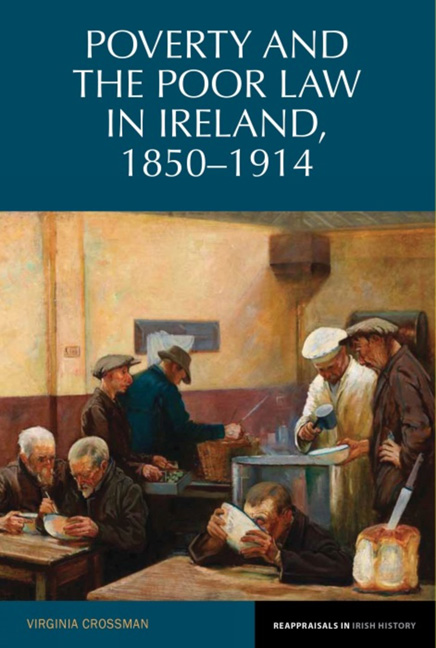Book contents
- Frontmatter
- Contents
- List of Figures
- List of Tables
- List of Maps
- Acknowledgements
- Introduction
- Chapter 1 Concepts of Poverty and Poor Relief
- Chapter 2 Context and Trends
- Chapter 3 Outdoor Relief
- Chapter 4 The Workhouse
- Chapter 5 The Sick, Infirm and Lunatics
- Chapter 6 Single Mothers and Prostitutes
- Chapter 7 Mendicancy and Vagrancy
- Conclusion
- Note on statistics and Sources
- Bibliography
- Index
Chapter 3 - Outdoor Relief
- Frontmatter
- Contents
- List of Figures
- List of Tables
- List of Maps
- Acknowledgements
- Introduction
- Chapter 1 Concepts of Poverty and Poor Relief
- Chapter 2 Context and Trends
- Chapter 3 Outdoor Relief
- Chapter 4 The Workhouse
- Chapter 5 The Sick, Infirm and Lunatics
- Chapter 6 Single Mothers and Prostitutes
- Chapter 7 Mendicancy and Vagrancy
- Conclusion
- Note on statistics and Sources
- Bibliography
- Index
Summary
In Ireland, even more so than in England, the workhouse dominates popular awareness of the poor law. Despite recent research that has highlighted the importance of outdoor relief and its significance as a political issue, the workhouse remains the element with which people are most familiar and which is believed to define the system. The reason for this, as Snell has noted in relation to England, is two-fold. The workhouse generated a mass of archival material and it was the focus of extensive commentary and debate. Officials were required to keep detailed records relating to the management of the workhouse and its inmates, many of which have survived. For many unions we can see who was admitted to the workhouse and how long they stayed. We can discover how inmates were treated and how they behaved. Outdoor relief generated far fewer records and those that were produced have frequently been destroyed. It is difficult to establish who received relief and on what grounds, and even more difficult to follow claimants through the outdoor relief process. There was considerable drama and emotion attached to the workhouse as an institution. It provided the setting for stories of hardship and abuse, of sex, violence and disorder. The administration of outdoor relief was more prosaic, more mundane, and involved little that was dramatic or entertaining. Nevertheless, an understanding of how the outdoor relief system operated is essential to an understanding of the poor law system.
The poor law authorities associated outdoor relief with excessive expenditure, dependency and lax administration, based on subjective rather than objective assessment and personal feeling rather than rational need. The new Poor Law in England attempted to establish a system in which outdoor relief would be the exception rather than the rule. Under the Irish poor law of 1838 there was no outdoor relief. Offering only indoor relief, its architects hoped, would ensure that the system would be self-regulating and that costs would be manageable. The introduction of outdoor relief in 1847 represented a fundamental change, although it was not until later decades of the nineteenth century that the implications of this were to become fully apparent. Having been introduced against the wishes of a significant body of opinion in Ireland across the political spectrum, the experience of the Famine further polarised attitudes to the poor law.
- Type
- Chapter
- Information
- Poverty and the Poor Law in Ireland, 1850–1914 , pp. 63 - 100Publisher: Liverpool University PressPrint publication year: 2013



